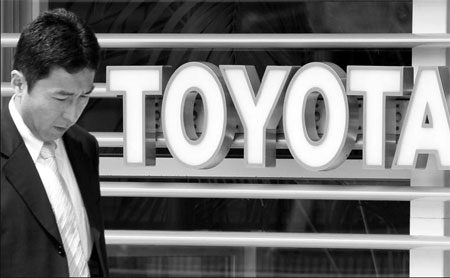Talks held over Diaoyu Islands
|
A man walks past a Toyota Motor Corp logo outside its showroom in Tokyo. The dispute over the Diaoyu Islands between China and Japan has hurt economic relations. Tokyo confirmed on Wednesday that diplomats from the two countries met over the weekend to discuss the Diaoyu Islands, in a sign that lines of communication remain open between the two sides. Yuriko Nakao / Reuters |
Chinese and Japanese diplomats discuss dispute at Shanghai meeting
Chinese and Japanese diplomats met over the weekend to discuss the Diaoyu Islands, Tokyo confirmed on Wednesday, in a sign that lines of communication remain open between the two countries.
The meeting between the vice-ministers of foreign affairs, the second in a month, came as relations experienced a period of severe turbulence after Japan "purchased" the islands in September.
Despite the meeting, reports emerged on Wednesday that Japanese Defense Minister Satoshi Morimoto watched a drill simulating the landing on an uninhabited island. The Japanese media said the drill was "targeting China".
Japanese Vice-Minister of Foreign Affairs Chikao Kawai met Chinese officials, including his counterpart, Zhang Zhijun, in Shanghai over the weekend to discuss the Diaoyu Islands, Japanese media said on Wednesday.
Kyodo News reported that the two nations agreed to "enhance communication".
"I am aware of the reports," Japanese Chief Cabinet Secretary Osamu Fujimura said at a regular news conference in Tokyo.
"That was part of the communication going on between Japan and China in various forms and at various levels. It just shows we are in constant contact at many levels."
Foreign Ministry spokesman Hong Lei said on Wednesday in Beijing that the countries had always been in contact, especially over the Diaoyu Islands.
Relations plunged after the Japanese government "purchased" the islands from a Japanese "owner" last month, triggering massive protests and calls to boycott Japanese products across China.
Yang Bojiang, a professor of Japanese studies at the University of International Relations in Beijing, said Tokyo always denied there was a territorial dispute, but recent pressure from the political arena and the general public may have resulted in a shift.
Yang warned that Tokyo, even as it takes a diplomatic route, has not given up military preparations.
The Japanese Coast Guard and Maritime Self-Defense Force on Wednesday held a joint drill to track "suspicious vessels", a move Japanese newspaper Sankei Shimbun said was aimed at patrols of Chinese vessels in the waters off the Diaoyu Islands.
Japanese business leaders called on the two countries to solve the dispute.
Hiromasa Yonekura, chairman of the Japan Business Federation, on Wednesday warned that ties "have begun to show the deep impact in business operations as well as the economy".
During a speech in Sapporo, Japan, Yonekura said "communication so far between Japan and China is far from enough", and both countries should use calm, diplomatic means to improve ties.
Japan's economy has suffered the consequences of the dispute.
Exports to China witnessed a monthly slump of 14.1 percent in September, Japan's Ministry of Finance said on Monday.
Observers said around half of Japan's exports depend on cars, but vehicle exports to China in September suffered an annual drop of 44.5 percent.
China is Japan's largest trade partner while Japan is China's third-largest trade partner.
Bilateral trade in 2011 passed $340 billion, and Japan's exports to China are two times those to the United States.
"The deteriorating relationships with China could prove to be a major blow to the Japanese economy," Ryutaro Kono, chief economist at BNP Paribas in Tokyo, told Dow Jones Newswires.
"If this problem continues into early next year ... an economic recession would be unavoidable" in Japan, he said.
Jin Baisong, a researcher with the Chinese Academy of International Trade and Economic Cooperation under the Ministry of Commerce, said latest economic figures from Japan showed that the row with China has hit its economy hard.
Contact the writers at zhangyunbi@chinadaily.com.cn and wujiao@chinadaily.com.cn
AFP contributed to this story.



















